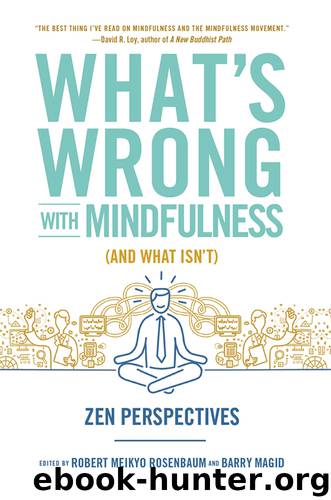What's Wrong with Mindfulness (and What Isn't) by Barry Magid

Author:Barry Magid
Language: eng
Format: epub
Publisher: Wisdom Publications
WHEN MINDFULNESS IS TOO MUCH15
by Gil Fronsdal
Surprisingly, the day came when I had to give up mindfulness. While this was temporary, it proved to be a necessary step in my path toward liberation. To show how this was the case, I will explain a bit of my history with Buddhist practice.
Before practicing mindfulness in Theravada Buddhism, I spent years practicing Zen. I remain very grateful for my early years of Zen training; it was a remarkable training in being present for life. First, I learned a lot about how I was not present. As I learned to be more attentive to my present-moment experience, I then learned a lot about how I reacted for and against this experience. Slowly I learned to be present without any observable reactivity. I understood this nonreactivity as a practice of unconditional acceptance in which experiences were allowed to exist in an open awareness.
In the course of this Zen training I had a range of meaningful experiences. I not only came to understand something of the interconnected aspect of our life and world, I had insights where this was seen in vivid and awe-inspiring clarity. Other times my experience could not be described in the usual subject-object perspective; refreshingly, I was not aware of any sense of self in the very intimate flow of experience.
I came to value the Zen approach that everything was practice — that everything that was happening was something to offer my full presence to.
But I noticed some of my fellow Zen practitioners’ ideas about Zen practice were different from mine. In particular, some students believed that there was one thing we were not supposed to be present for, either because it did not exist or because it was second-best or somehow wrong to experience. The unacceptable experience or transformation was any that could be labeled “enlightenment.” Some Zen friends had the attitude that the only thing to do with a so-called enlightenment experience was to let it go and preferably forget all about it as we moved into the next moment with full awareness. Others believed there was no such thing as enlightenment as a clear and dramatic transformative experience. Or if there was enlightenment, it was not the radical, life-altering experience some people reported. Rather it was any moment in the course of ordinary life when there was no subject-object distinction or there was some meaningful level of acceptance and peace.
While I did not know what enlightenment might be, I was confused by ideas that seemed to belittle or dismiss it. I was even more confused knowing how important enlightenment was for the Buddha and for much of Buddhism.
After my Zen training, I engaged in intensive Vipassana training in Burma. The mindfulness practice I was taught there helped me to see that the acceptance I had experienced through Zen was not as thorough an acceptance as I had believed. Through careful and sustained mindfulness I saw an array of subtle — almost underground — thoughts and intentions that were not accepting.
Download
This site does not store any files on its server. We only index and link to content provided by other sites. Please contact the content providers to delete copyright contents if any and email us, we'll remove relevant links or contents immediately.
| Acupuncture & Acupressure | Aromatherapy |
| Ayurveda | Chelation |
| Chinese Medicine | Energy Healing |
| Healing | Herbal Remedies |
| Holistic | Homeopathy |
| Hypnotherapy | Massage |
| Meditation | Naturopathy |
| Reference |
Inner Engineering: A Yogi's Guide to Joy by Sadhguru(6797)
The Power of Now: A Guide to Spiritual Enlightenment by Eckhart Tolle(5785)
Fear by Osho(4740)
Ikigai by Héctor García & Francesc Miralles(4275)
The Art of Happiness by The Dalai Lama(4130)
The Ultimate Bodybuilding Cookbook by Kendall Lou Schmidt(3946)
Yoga Therapy by Mark Stephens(3749)
The Little Book of Hygge by Meik Wiking(3694)
The Healing Self by Deepak Chopra(3583)
Why Buddhism is True by Robert Wright(3454)
The Hatha Yoga Pradipika (Translated) by Svatmarama(3343)
Being Aware of Being Aware by Rupert Spira(3277)
Shift into Freedom by Loch Kelly(3199)
Wild Words from Wild Women by Stephens Autumn(3154)
Work Clean by Dan Charnas(3123)
Happiness by Matthieu Ricard(3050)
More Language of Letting Go: 366 New Daily Meditations by Melody Beattie(3030)
Yoga Body & Mind Handbook by Jasmine Tarkeshi(2880)
Why I Am Not a Feminist by Jessa Crispin(2761)
